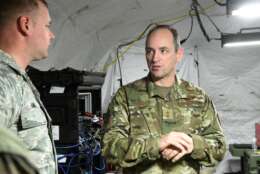IT Modernization
-
Chi Kang, deputy director for Operations in NOAA’s Cyber Security Division, talked about how the agency made the pandemic shift to large-scale telework and how its modernizing legacy network systems.
September 22, 2020 -
A governmentwide push to improve the quality and scope of public services, available on agency websites, has gained momentum during the coronavirus pandemic.
September 22, 2020 -
This week on Federal Tech Talk, Nicholas Chaillan, The Air Force's Chief Software Officer, joins host John Gilroy to discuss Platform One and Cloud One, and why they are creative and innovative approaches to improving software for the service.
September 21, 2020 -
GSA’s NewPay and DHS’ cyber quality service management office (QSMO) are going to be the first initiatives out of the gate with new capabilities in 2021, while grants, financial management and others are expecting major changes too next year.
September 21, 2020 -
Maj. Gen. Kevin Kennedy, the Air Force’s assistant deputy chief information officer for digital transformation, said Offutt Air Force Base and Buckley Air Force Base have received the go-ahead to go from a 10% capacity on their network-as-a-service up toward 100% capacity.
September 17, 2020 -
The Department of Veterans Affairs wants to reprogram $243 million from Coronavirus Aid, Relief and Economic Security (CARES) Act funds to overhaul yet another series of legacy IT systems.
September 16, 2020 -
As technical director of DISA’s Infrastructure Directorate, Bryon Doyle said his job is to have an oversight of the organization’s architecture.
September 15, 2020 -
John Harrison, senior cyber security solutions architect at Criterion joins host John Gilroy on this week's Federal Tech Talk to discuss the cybersecurity challenges that federal IT officials face during the Covid-19 pandemic.
September 14, 2020 -
The Senate Homeland Security and Governmental Affairs Committee found agencies saved $450 million over the last two years through the Making Electronic Government Accountable By Yielding Tangible Efficiencies (MEGABYTE) Act.
September 14, 2020 -
Only a little more than a third of the R&D expenses the Pentagon reimburses contractors for each year match up with the department's own modernization priorities, the Government Accountability Office says.
September 14, 2020 -
Federal contractors have sensed a certain sluggishness in the government's pace of awarding contracts during the pandemic. Now, a review of this phenomenon finds it's more pronounced in the intelligence community.
September 11, 2020 -
The Department of Health and Human Services’ Administration for Children and Families launched a pilot last year using business intelligence tools, robotics process automation and machine learning tools to alleviate the burden on agency grant processors.
September 10, 2020 -
Education Department CISO Steven Hernandez said the council wanted to plan for the next five to 10 years of agency network priorities and how to prepare for an emergency.
September 08, 2020 -
The rapid payout program spawned by the government's coronavirus response legislation has sharpened an old problem. A small but persistent percentage of Americans entitled to various benefits programs don't have bank accounts.
September 08, 2020 -
Bryan Slater, the assistant secretary for administration and management at the Labor Department, details the agency’s progress in consolidating back-office functions and driving efficiencies.
September 07, 2020














